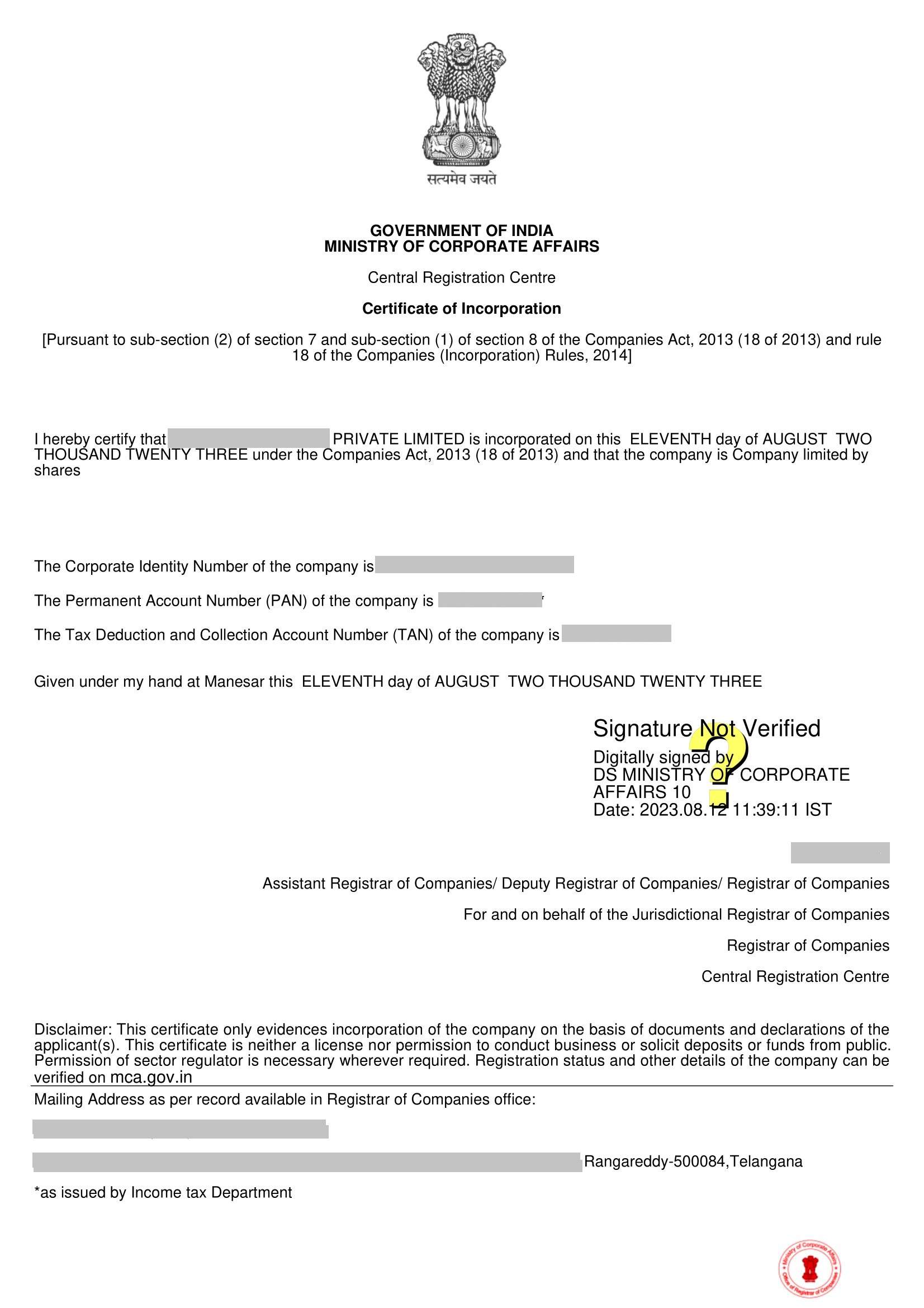Private Limited Registration
₹20,000.00 Original price was: ₹20,000.00.₹16,000.00Current price is: ₹16,000.00.
Get your Private Limited Company Registered in Hyderabad with ease! Invention Tax Solutions offers expert, affordable, and fast registration with end-to-end support. Book your free consultation today!
Private Limited Company Registration Services in Hyderabad
Launch Your Dream Business with Hassle-Free PVT LTD Company Registration in Hyderabad
Are you planning to start a private limited company in Hyderabad? At Invention Tax Solutions, we offer Private Limited Company Registration services in Hyderabad with expert guidance, fast processing, and complete compliance support. Whether you’re a first-time entrepreneur or a seasoned business owner, our registration service ensures your company is legally structured and ready for growth.
Setting up a private limited company is the most preferred business structure in India for startups and growing businesses. It not only provides credibility but also offers legal protection and funding opportunities.
Let us help you simplify the process, minimize paperwork, and register your company smoothly.
Why Choose a Private Limited Company Structure?
A Private Limited Company (Pvt Ltd) is a corporate structure that offers limited liability to its shareholders, a separate legal identity, and better access to funding.
Key Benefits:
- Limited Liability: Shareholders are liable only for the amount they invest.
- Separate Legal Entity: The company is distinct from its owners.
- Easy Fundraising: Attracts investors and banks more easily.
- Perpetual Existence: Continues even if owners change.
- Credibility: Higher trust among clients, vendors, and financial institutions.
Our Private Limited Registration Services in Hyderabad
At Invention Tax Solutions, we handle every step of your company registration in Hyderabad. Our end-to-end solutions are designed to save your time and ensure 100% compliance.
Our Service Includes:
- DIN (Director Identification Number) & DSC (Digital Signature Certificate)
- Name Reservation with MCA (Ministry of Corporate Affairs)
- Drafting of MOA & AOA (Memorandum and Articles of Association)
- Filing of Incorporation Documents
- PAN & TAN Application
- Company Incorporation Certificate
- Free Business Consultation
- Dedicated Support Throughout the Process
📌 All-inclusive pricing. No hidden charges.
Documents Required for Private Limited Company Registration
To register your company, you will need to provide the following documents:
- Passport-size photograph of directors
- PAN Card of all directors
- Aadhaar Card / Voter ID / Passport / Driving License
- Proof of business address (electricity bill/rent agreement, etc.)
- No Objection Certificate from property owner (if rented)
Who Should Opt for Private Limited Company Registration in Hyderabad?
This business structure is ideal for:
- Startups looking to raise funding
- Freelancers and consultants ready to scale
- E-commerce entrepreneurs
- Manufacturing and service-based businesses
- Tech companies
If you’re serious about building a scalable business, Private Limited Company Registration in Hyderabad is your best bet.
Why Choose Invention Tax Solutions?
- ✅ 10+ Years of Expertise in Company Registrations
- ✅ Local Hyderabad Experts Who Understand Regional Compliance
- ✅ Affordable Packages Tailored for Small & Medium Businesses
- ✅ Dedicated Account Manager for Personalized Support
- ✅ All-in-One Services Including GST, Trademark, MSME & Trade Licenses
- ✅ Thousands of Satisfied Clients Across Telangana
Additional Services We Offer:
Besides private limited registration, we also help with:
- GST Registration in Hyderabad
- Trade License Registration in Hyderabad
- Labour License Registration in Hyderabad
- MSME Registration in Hyderabad
- Trademark Registration in Hyderabad
You can combine services for cost savings and convenience. Ask us about bundled offers!
Real-Life Example:
Case Study: Ramesh, a tech startup founder from Madhapur, Hyderabad, approached us to register his company. Within 6 working days, we completed the entire process including PAN, TAN, and GST registration. Today, his business has scaled to 25+ employees and secured angel investment. He credits the smooth registration process and compliance support from Invention Tax Solutions for setting the right foundation.
Step-by-Step Process of Pvt Ltd Registration in Hyderabad
- Consultation – Free expert advice to choose the right structure.
- Document Collection – Upload your documents online.
- Digital Signature & DIN – We apply and process them.
- Company Name Approval – Fast and smooth process.
- Incorporation Filing – Complete filing with MCA.
- Company Incorporation Certificate – You are now a registered company!
We make the entire journey fast, simple, and 100% digital.
Frequently Asked Questions (FAQs)
1. What is the cost of private limited company registration in Hyderabad?
Our packages are affordable and all-inclusive. Get in touch for a customized quote.
2. How long does it take to register a Pvt Ltd company?
It usually takes 5 to 7 working days, provided all documents are in order.
3. Is a physical office required for registration?
Yes, you need a registered address in Hyderabad, but it can be a residential or commercial space.
4. Can NRIs or foreign nationals register a company in Hyderabad?
Yes, but at least one director must be an Indian resident.
5. Do I need to be physically present in Hyderabad to register?
No. Everything is handled online and through email/phone.
6. What are MOA and AOA?
Memorandum and Articles of Association are legal documents defining your company’s objectives, rules, and structure.
7. Can I convert a private limited company into another structure later?
Yes. You can convert it into an LLP or Public Limited Company as your business grows.
8. What compliance is required after registration?
Annual filings, income tax returns, and maintaining statutory registers.
9. Can I open a bank account with the certificate?
Yes. The incorporation certificate and PAN/TAN enable you to open a current account.
10. Will I get GST registration with this?
It’s optional, but we can handle it along with your company registration.
Call to Action
Ready to register your private limited company in Hyderabad?
👉 Contact Invention Tax Solutions today for a free consultation and get started on your business journey with confidence.
📞 Call us at 7993132530
📧 Email: inventiontax@gmail.com
🌐 Visit: inventiontax.com
Let’s build your dream business, the right way!





